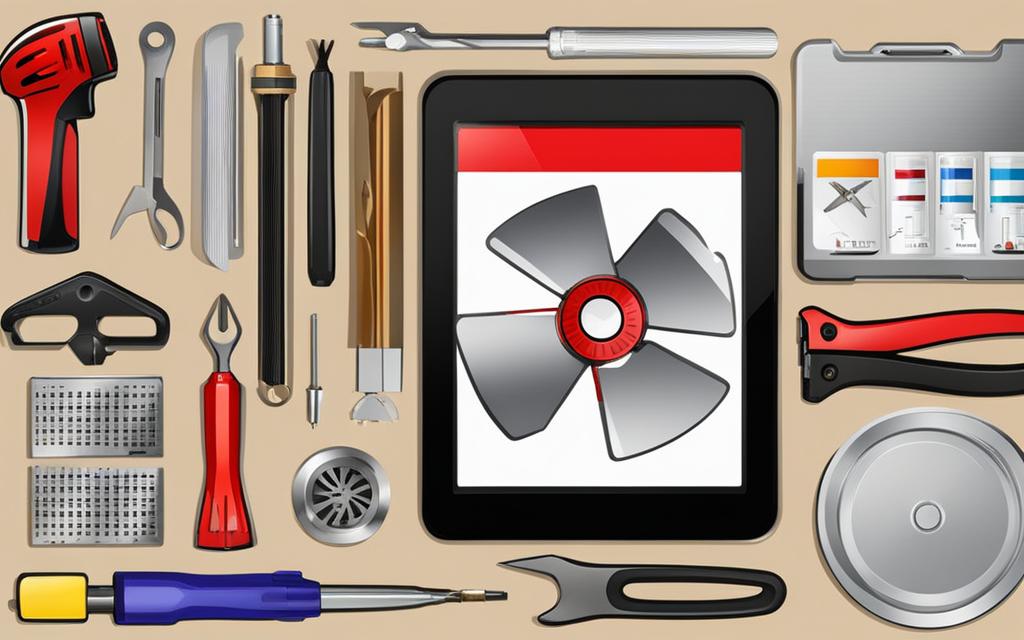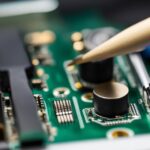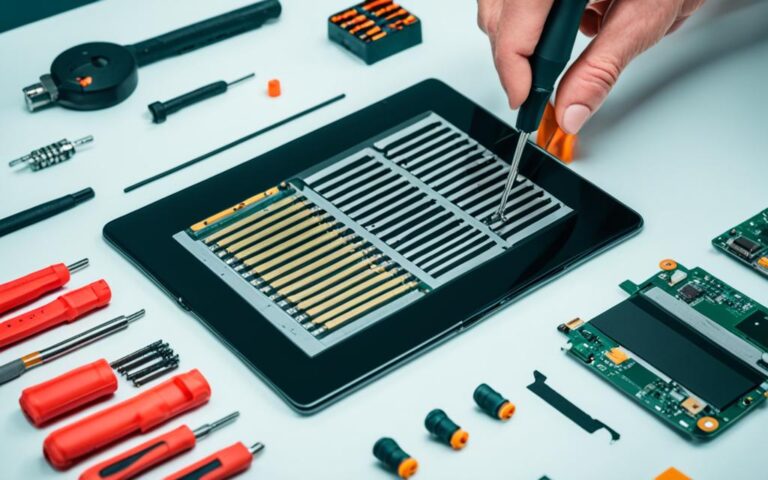Addressing Tablet Fan Noise and Malfunctions
Excessive fan noise and malfunctions can be a common issue with tablets and laptops. While some noise is normal, constant loud fan noise can indicate underlying problems that need to be addressed. This article will provide effective solutions and tips for reducing tablet fan noise and resolving common malfunctions.
Tablets and laptops are essential devices for work and entertainment. However, when the tranquility of these devices is disrupted by fan noise, it can be quite bothersome. The incessant whirring and buzzing can not only hinder concentration but also indicate potential malfunctions that may affect the overall performance of the device.
Whether it’s a tablet fan noise or a laptop overheating issue, it’s important to address these problems promptly to ensure optimal device functionality and durability. This article will provide you with solutions to reduce tablet fan noise and tips to resolve common malfunctions effectively.
Is it normal for a tablet fan to make noise?
While tablets are designed to operate silently, it is normal for a tablet fan to make some noise when it is working to cool down the device. The fan’s primary function is to regulate the tablet’s temperature by circulating air and dissipating the heat generated by the internal components. This process can generate a low level of noise, which is considered normal.
However, it is essential to distinguish between normal tablet fan noise and excessive tablet fan noise. Normal tablet fan noise is typically low to moderate and intermittent, occurring during periods of high usage or when the tablet is undergoing resource-intensive tasks. The fan noise should not persist or become excessively loud and intrusive.
If you notice that the tablet fan noise becomes excessive or constant, it may indicate a problem with the tablet’s fan performance. Excessive tablet fan noise can be a sign of various issues, such as dust accumulation, overheating, or fan damage. Addressing these issues is crucial to ensure optimal tablet performance, longevity, and user experience.
When determining the normality of tablet fan noise, it is also essential to consider the specific tablet model and brand. Different tablets may have varying fan designs and noise levels. Referring to the tablet’s manufacturer guidelines or reaching out to their customer support can provide valuable insights into the expected fan performance and noise levels for your particular tablet.
Tablet Fan Noise Comparison
| Tablet Model | Normal Fan Noise Level |
|---|---|
| Brand X Tablet | Low to moderate |
| Brand Y Tablet | Low to moderate |
| Brand Z Tablet | Low to moderate |
Common Causes of Excessive Tablet Fan Noise
Excessive tablet fan noise can stem from various underlying causes. The most common factors include:
- Dust accumulation in the tablet’s vents and cooling fan
- Overheating due to resource-intensive tasks or inadequate ventilation
- Physical damage to the fan blades or internal components
“Excessive tablet fan noise can be a sign of dust accumulation, overheating, or fan damage.”
Identifying the cause of excessive tablet fan noise is crucial for implementing effective solutions and resolving the issue. In the next section, we will explore how to fix tablet fan noise and ensure optimal tablet performance.
Common causes of tablet fan noise
Tablets are generally designed to operate silently, but when the fan starts making noise, it can be a cause for concern. Understanding the common causes of tablet fan noise can help you diagnose and resolve the issue effectively. Here are the most frequent culprits:
- Dust Accumulation: Dust particles can accumulate in the tablet’s vents and cooling fan, obstructing airflow. This can cause the fan to work harder, leading to increased noise. Regular cleaning can help prevent dust accumulation and minimize fan noise.
- Overheating: Demanding tasks or inadequate ventilation can cause a tablet to overheat. To cool down the device, the fan might spin faster, generating more noise. Ensuring proper airflow and avoiding prolonged resource-intensive activities can help prevent overheating and reduce fan noise.
- Physical Damage: Damage to the fan blades or internal components of the tablet can result in abnormal fan noises. Accidental bumps or drops can cause misalignment or imbalances, affecting the smooth operation of the fan. In such cases, professional assistance may be required to repair or replace the fan.
If you’re experiencing tablet fan noise, these common causes are worth investigating. By addressing these issues, you can restore your tablet’s optimal performance and enjoy a quieter experience.
How to fix tablet fan noise
If you’re experiencing excessive fan noise from your tablet, there are several steps you can take to address this issue and restore peace and quiet to your device. By following these solutions, you can reduce tablet fan noise and optimize its performance.
1. Change the Position and Enhance Ventilation
The location of your tablet can affect its airflow and fan noise. Ensure that your tablet is placed on a flat, stable surface that allows proper ventilation. Avoid using your tablet on soft surfaces like beds or couches, as they can obstruct airflow and cause the fan to work harder, resulting in more noise.
2. Clean the Tablet’s Vents and Fan
Regularly cleaning the tablet’s vents and fan is crucial for minimizing dust accumulation, improving airflow, and reducing fan noise. Use a soft, lint-free cloth or compressed air to gently remove the dust and debris that may have gathered on the vents. Be careful not to damage any components in the process.
3. Manage Power Settings and Update Drivers
Adjusting your tablet’s power settings can help optimize its performance and reduce fan noise. Reduce the brightness of your screen, disable unnecessary background processes, and adjust power-saving settings to minimize the workload on your tablet’s fan.
Additionally, updating your tablet’s drivers and system software can ensure that it is running efficiently and minimize fan noise. Check for updates regularly and install them as necessary.
4. Consider Using a Cooling Pad
A cooling pad can provide additional airflow and help dissipate heat from your tablet, reducing the workload on the fan and minimizing noise. These pads often have built-in fans that enhance cooling efficiency and can be used as a portable solution for reducing fan noise.
5. Seek Professional Help for Repair or Replacement
If the above solutions do not resolve the tablet fan noise issue, it may be necessary to seek professional assistance. A qualified technician can diagnose the problem and perform tablet fan repair or replacement if required. This ensures that your tablet is functioning optimally and quietly.
By following these steps, you can effectively reduce tablet fan noise and enjoy a quieter and more efficient tablet experience. Taking proactive measures to maintain your tablet, such as regular cleaning and software updates, can help prevent fan noise issues in the future. Remember to consult a professional if needed for further assistance with tablet fan repair or replacement.
Tablet fan noise during resource-intensive tasks
When using your tablet for resource-intensive tasks such as gaming or video editing, you may notice an increase in fan noise. This is because these tasks require a high amount of CPU usage, resulting in increased heat generation within the tablet. As a result, the fan needs to spin faster to cool down the device, resulting in more noise.
To mitigate tablet fan noise during resource-intensive tasks, there are several steps you can take:
- Ensure Proper Ventilation: Make sure that your tablet has proper ventilation by keeping its vents clear of obstructions. Placing your tablet on a flat surface that allows air to circulate can also help in dissipating heat effectively.
- Use Efficient Software: Opt for software that is optimized for tablet performance. Resource-heavy applications may cause your tablet’s CPU to work harder, increasing heat and fan noise. Consider using lightweight alternatives or adjusting the software settings to reduce the strain on your tablet.
- Consider Undervolting the CPU: Undervolting is a technique where you lower the voltage supplied to the tablet’s CPU, reducing its power consumption and heat generation. This can help lower fan noise during resource-intensive tasks. However, please note that undervolting can potentially void your tablet’s warranty and should be done cautiously.
By implementing these measures, you can effectively manage tablet fan noise during resource-intensive tasks and ensure a more pleasant and productive experience.
Remember, it’s essential to strike a balance between performance and noise reduction. If you find that your tablet’s fan noise remains persistently high or exceeds normal levels, it may indicate an underlying issue that requires professional attention. In such cases, it is advisable to seek help from a qualified technician or the manufacturer’s support.
Tablet fan noise troubleshooting tips
If you have tried the previous solutions and are still experiencing excessive tablet fan noise, it may be necessary to troubleshoot the issue. Here are some troubleshooting tips to help you identify and resolve the problem:
- Check for viruses or malware: Viruses and malware can cause your tablet to overwork and generate more fan noise. Run a thorough scan using reliable antivirus software to eliminate any potential threats.
- Reset the tablet’s system management controller (SMC) and parameter random access memory (PRAM): Resetting the SMC and PRAM can help resolve software glitches that might be affecting the fan’s performance. Consult your tablet’s user manual or the manufacturer’s website for instructions on how to perform these resets.
- Update drivers: Outdated or incompatible drivers can impact fan performance and contribute to excessive noise. Visit the manufacturer’s website or use device management software to check for and install the latest driver updates.
If these troubleshooting steps do not solve the problem and you have exhausted all other options, it is advisable to seek professional help for further diagnostics and repair. Experienced technicians can identify hardware issues and provide expert assistance in resolving tablet fan noise problems.
Preventing tablet fan noise
Taking preventive measures can help prevent tablet fan noise from occurring in the first place. By implementing the following tips, you can maintain a quiet and efficient tablet, free from disruptive fan noise.
-
Regular Cleaning
Regularly cleaning the tablet’s vents and fan is crucial for preventing dust buildup, which can obstruct airflow and lead to noisy fan operation. Use a soft brush or compressed air to gently remove dust particles from the vents and fan blades. This simple maintenance task will improve airflow and minimize the risk of fan noise.
-
Clean Environment
Keeping your tablet in a clean environment is essential for preventing dust accumulation. Avoid using your tablet in dusty or dirty areas, as this can increase the chances of dust entering the device and clogging the fan. Maintain a clean workspace or use a protective cover to shield your tablet from dust and debris.
-
Cooling Pad
A cooling pad can provide additional ventilation and help dissipate heat, reducing the strain on the tablet’s fan. Invest in a quality cooling pad that suits the size and design of your tablet. These pads often come equipped with built-in fans or heat-absorbing materials to enhance cooling performance.
-
Dust Filters
Consider applying dust filters to the air vents of your tablet. These small mesh screens prevent dust particles from entering the device, minimizing the risk of fan blockage and noise. Make sure to clean or replace the filters regularly to maintain proper airflow.
-
Avoid Resource-Intensive Tasks
Extended periods of resource-intensive tasks can put excessive stress on the tablet’s fan, causing it to work harder and generate more noise. To prevent this, try to avoid running demanding applications or performing tasks that require high CPU usage for extended periods. When possible, opt for lightweight software that puts less strain on the tablet’s cooling system.
By practicing regular tablet fan maintenance, creating a clean environment, and optimizing your tablet usage, you can effectively prevent fan noise and enjoy a peaceful computing experience.
Conclusion
In conclusion, addressing tablet fan noise is vital for ensuring optimal tablet performance and a pleasant user experience. By implementing the following solutions and preventive measures, you can effectively reduce fan noise and maintain a quiet and efficient tablet.
Firstly, regular tablet fan maintenance is crucial. Cleaning the tablet’s vents and fan on a regular basis will prevent dust accumulation, improve airflow, and reduce the strain on the fan, thus minimizing noise. Additionally, proper ventilation is essential. Ensuring that the tablet is placed in a well-ventilated area and avoiding blockage of the vents will facilitate better heat dissipation and contribute to a quieter tablet.
Furthermore, software optimization plays a significant role. Managing power settings, updating drivers and BIOS, and using lightweight software can help optimize tablet performance and reduce fan noise. It is important to note that if the tablet fan noise issue persists or if physical damage to the fan is suspected, seeking professional help for tablet fan repair is recommended.
In summary, by adopting these tablet fan noise solutions, practicing tablet fan noise prevention measures, and prioritizing tablet fan maintenance, you can resolve fan noise issues and enhance the overall performance of your tablet. Taking care of your tablet’s fan will extend its lifespan and provide you with a more enjoyable and efficient tablet experience.












